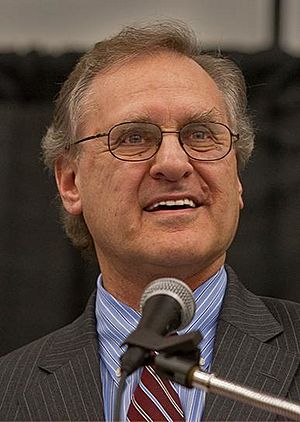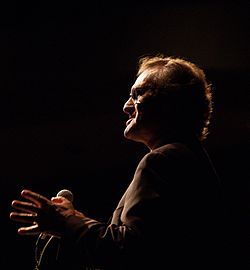Stephen Lewis facts for kids
Quick facts for kids
Stephen Lewis
|
|
|---|---|

Lewis in 2009
|
|
| United Nations Special Envoy for HIV/AIDS in Africa | |
| In office 2001–2006 |
|
| Succeeded by | Elizabeth Mataka |
| Canadian Ambassador to the United Nations | |
| In office 1984–1988 |
|
| Prime Minister | Brian Mulroney |
| Preceded by | Gérard Pelletier |
| Succeeded by | Yves Fortier |
| Ontario Leader of the Opposition | |
| In office 1975–1977 |
|
| Preceded by | Robert Nixon |
| Succeeded by | Stuart Lyon Smith |
| Leader of the Ontario New Democratic Party | |
| In office 1970–1978 |
|
| Preceded by | Donald C. MacDonald |
| Succeeded by | Michael Cassidy |
| Ontario Member of Provincial Parliament | |
| In office 1963–1978 |
|
| Preceded by | New district |
| Succeeded by | Richard Johnston |
| Constituency | Scarborough West |
| Personal details | |
| Born |
Stephen Henry Lewis
November 11, 1937 Ottawa, Ontario, Canada |
| Political party | New Democratic Party |
| Spouse |
Michele Landsberg
(m. 1963) |
| Relations | Daniel Libeskind (brother-in-law) Naomi Klein (daughter-in-law) |
| Children | 3, including Avi Lewis |
| Parent |
|
| Relatives | Moishe Lewis (grandfather) |
| Residences | Toronto, Ontario |
Stephen Henry Lewis (born November 11, 1937) is a well-known Canadian politician, speaker, and diplomat. He is famous for his work helping others around the world. In the 1970s, he was the leader of the Ontario New Democratic Party. Later, in the 1980s, he served as Canada's ambassador to the United Nations.
For many years, Stephen's father, David Lewis, was the leader of Canada's national New Democratic Party. After his time in politics, Stephen became a TV and radio broadcaster. In the 2000s, he took on a very important role as the United Nations' special representative for HIV/AIDS in Africa. For his amazing work, he was given the Order of Canada, one of Canada's highest honours.
Contents
Early Life and Schooling
Stephen Lewis was born in Ottawa, Ontario, on November 11, 1937. This date is also Armistice Day, which marks the end of World War I. Because of this, his parents gave him the Hebrew name "Sholem," which means "peace." His father, David Lewis, was a key figure in the Co-operative Commonwealth Federation (CCF), the political party that later became the NDP.
In 1950, his family moved to Toronto. He went to Oakwood Collegiate Institute and later Harbord Collegiate Institute for high school. After graduating, he attended the University of Toronto. He was a great debater and even debated future U.S. President John F. Kennedy in 1957. Lewis spent time studying at both the University of Toronto and the University of British Columbia.
Political Career
A Journey to Africa
In the 1960s, Lewis traveled to Africa. He was invited to a conference in Ghana but decided to stay longer. He spent over a year teaching and traveling across the continent. This trip had a huge impact on him and would shape his future work helping people in Africa.
Leader in Ontario Politics
After returning to Canada, Lewis was elected to the Legislative Assembly of Ontario in 1963 at just 26 years old. In 1970, he became the leader of the Ontario New Democratic Party. His first election as leader in 1971 was challenging, as the party lost one seat.
During this time, a group within the party called The Waffle was causing disagreements. Lewis felt they were creating problems for the NDP. In 1972, he took steps to deal with this issue, arguing that the party needed to be united.
In 1974, Lewis stood up for miners in Elliot Lake. He pushed the government to create a special commission to study the health and safety of miners. This led to a new law in 1979 called the Occupational Health and Safety Act, which helped protect workers.
The 1975 Election
Lewis led a powerful campaign in the 1975 election. He was a passionate speaker and won over many new supporters. He talked about important issues like rent control and making workplaces safer. His campaign was so successful that the ruling Ontario Progressive Conservative Party promised to make some of these changes to stay in power.
In the end, the NDP doubled its seats from 19 to 38. This made them the Official Opposition, the second-largest party in the government. It seemed like the NDP was on its way to one day leading the province.
However, the next election in 1977 was a letdown. The NDP did not gain any more seats and lost its status as the Official Opposition. Feeling disappointed, Lewis stepped down as party leader in 1978.
Life After Politics
After leaving politics, Lewis worked as a radio and TV commentator. He appeared on CBC Radio and Toronto's Citytv. He became known for his smart and interesting political discussions.
Working for the World
Canada's UN Ambassador
In 1984, Prime Minister Brian Mulroney appointed Lewis as Canada's Ambassador to the United Nations. This was a big job where he represented Canada on the world stage. He held this important position until 1988.
Fighting HIV/AIDS in Africa
From 2001 to 2006, Lewis served as the UN Special Envoy for HIV/AIDS in Africa. In this role, he worked hard to bring attention to the AIDS crisis. He traveled across Africa, speaking about the need for more help and resources. He urged world leaders to keep their promises to support the people affected by the disease. Many people praised him for his powerful and effective work.
In 2005, he wrote a book called Race Against Time. In it, he described the urgent situation in Africa and criticized the world for not doing enough to help.
Helping Through Foundations
The Stephen Lewis Foundation
Lewis is the leader of the Stephen Lewis Foundation. This non-profit group raises money to help people in Africa who are affected by HIV and AIDS. The foundation supports community-based projects that provide care, medicine, and support to those in need.
AIDS-Free World
In 2007, Lewis co-founded another organization called AIDS-Free World. This group pushes for better global action to fight HIV and AIDS. One of its goals is to make sure that world leaders and organizations are held accountable for their promises.
Personal Life and Family
Stephen Lewis comes from a family deeply involved in politics. His father was David Lewis, a former leader of the federal NDP. His grandfather, Moishe Lewis, was also a political activist.
Lewis is married to Michele Landsberg, a journalist. They have three children, including Avi Lewis, who is a broadcaster and filmmaker. Avi is married to the well-known author Naomi Klein.
In 2021, Lewis shared that he was receiving treatment for cancer.
Awards and Recognition
For his incredible humanitarian work, Stephen Lewis was made a Companion of the Order of Canada in 2003. This is one of the highest honours a Canadian can receive.
Two high schools in the Toronto area are named after him: Stephen Lewis Secondary School in Mississauga and Stephen Lewis Secondary School in Vaughan.
He has also received many other awards, including the World Citizenship Award from the World Association of Girl Guides and Girl Scouts. He holds over 30 honorary degrees from universities, recognizing his contributions to Canada and the world.
 | James Van Der Zee |
 | Alma Thomas |
 | Ellis Wilson |
 | Margaret Taylor-Burroughs |


